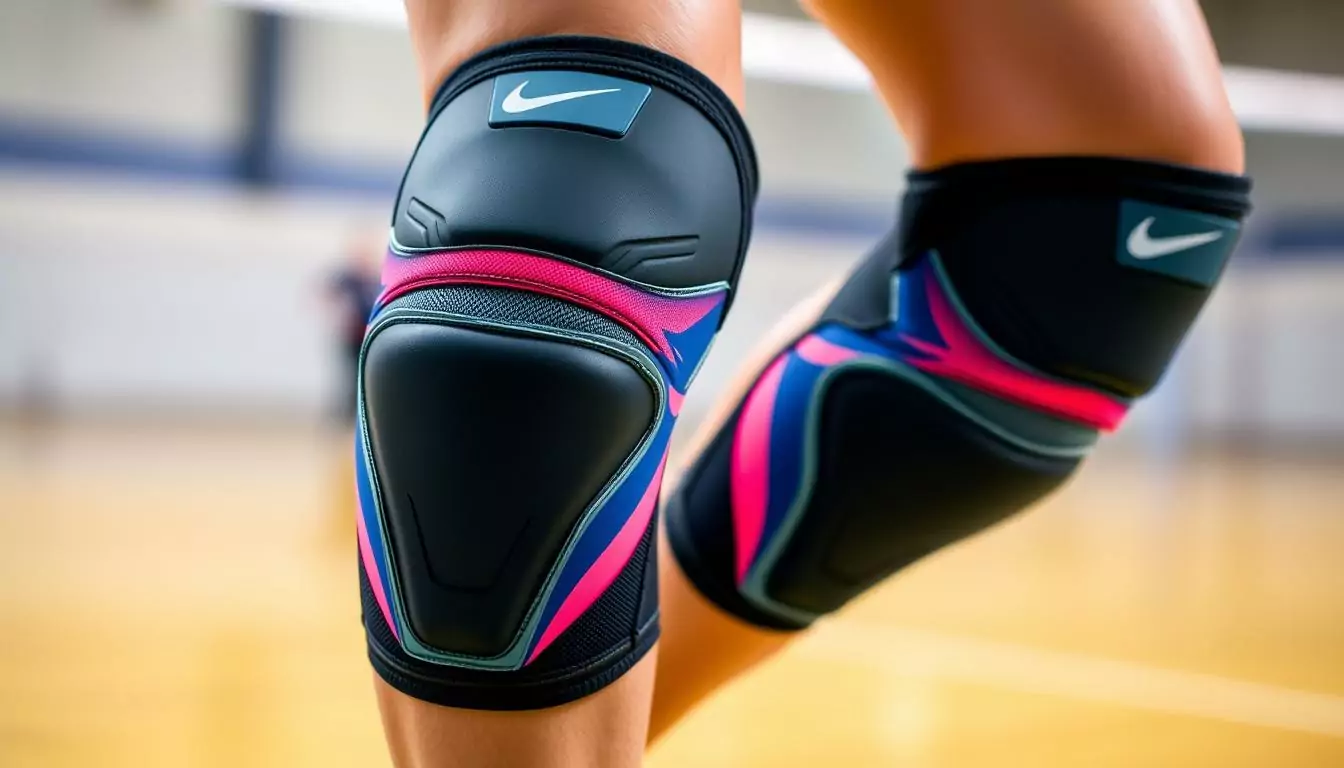Knee pain affects 85% of volleyball players during their careers. This highlights the need for proper knee protection in volleyball. Good knee pads are vital for safety and performance, whether you play casually or competitively.
This guide explores women’s volleyball knee pads, covering sizing, materials, and injury prevention tips. We’ll help you choose the right fit and protection level for your playing style. Your knees will stay safe, and your game will remain strong.
Volleyball knee pads have improved greatly over time. Modern designs offer better protection without limiting comfort or movement. We’ll look at top brands, sizing charts, and care tips for this essential gear.
Key Takeaways
- Proper knee pad sizing is crucial for optimal protection and performance
- Women’s volleyball knee pads come in various sizes and protection levels
- Understanding your playing position can help in choosing the right knee pads
- Regular maintenance extends the life and effectiveness of your knee pads
- Investing in quality knee pads can prevent injuries and enhance your game
Understanding the Importance of Knee Protection in Volleyball
Volleyball puts a lot of stress on your knees. Knee pads are vital for keeping players safe and helping them perform well. Let’s look at why knee protection matters in this fast-paced sport.
The role of knees in volleyball movements
Knees do a lot of work in volleyball. They hold your weight, keep you balanced, and soak up shock when you jump and land. Good knee protection helps you move with confidence and lowers your risk of getting hurt.
Common knee injuries in volleyball
Knee injuries are common in volleyball. Over 80% of players have knee problems during their careers. Without good knee pads, you’re more likely to get:
- Bruising and abrasions
- Patellar tendonitis
- Ligament sprains
- Meniscus tears
Long-term benefits of using knee pads
Good knee pads offer many benefits:
- Enhanced knee injury prevention
- Increased confidence in movements
- Improved performance on the court
- Extended playing career
Knee pads cost less than $100 but can save you from costly treatments later. They’re a small price to pay for your health and success in volleyball.
| Benefit | Without Knee Pads | With Knee Pads |
|---|---|---|
| Injury Risk | High | Significantly Reduced |
| Player Confidence | Lower | Higher |
| Career Longevity | Potentially Shortened | Extended |
| Performance | Compromised | Enhanced |
Placing knee pads correctly is crucial. Wear them below your knees for the best protection during dives, falls, and slides. This guards weak spots and supports your joints without limiting movement.
Types of Volleyball Knee Pads for Women
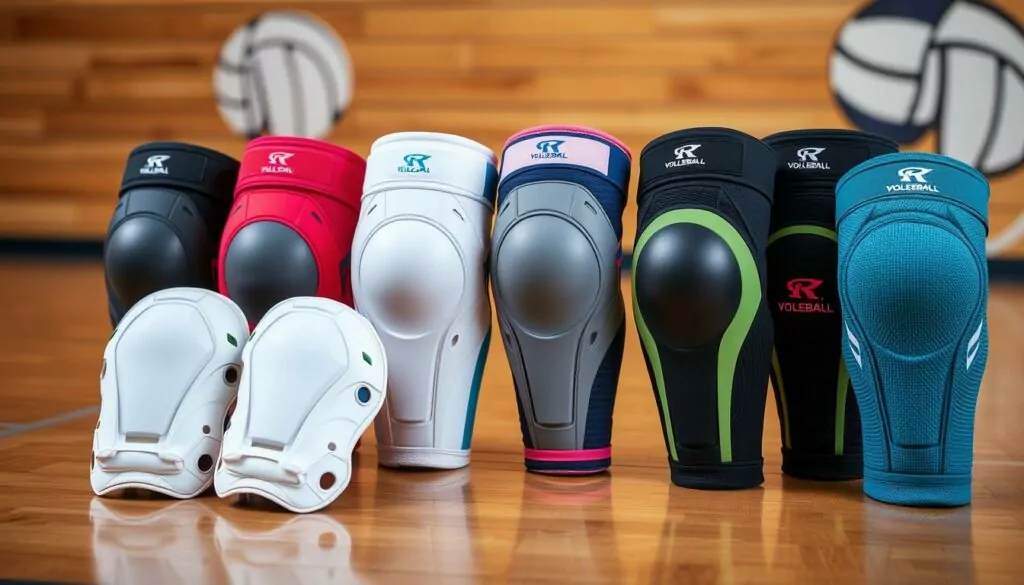
Knee pads are crucial for women’s volleyball. They come in various types to suit different player needs. Let’s look at the options available for volleyball enthusiasts.
Entry-level knee pads provide basic protection for beginners. They have thinner padding and are more affordable. These pads suit recreational players or those new to volleyball.
Medium-protection knee pads balance comfort and safety for regular players. They feature moisture-wicking materials and offer more coverage. These pads are ideal for those who play often.
Professional-grade knee pads are built for competitive play. They have extra padding, superior shock absorption, and ergonomic designs. Serious athletes prefer these high-end pads for top-notch protection.
| Brand | Size Range | Knee Width Measurement |
|---|---|---|
| Mizuno | Small to Large | 13″ or less (S), 13-15.5″ (M), 15.5″+ (L) |
| Nike | XS to Large | 13″ to 21″ |
| ASICS | One size fits all | Medium with flexibility |
Consider your playing style, position, and frequency when choosing knee pads. Read volleyball knee pad reviews for insights on different brands and models. The right knee pads can greatly improve your comfort and safety.
Key Features to Look for in Women’s Volleyball Knee Pads
Choosing the right knee pads is vital for comfort and safety in volleyball. Let’s explore key features for optimal performance and protection.
Material Composition
Knee pad materials greatly impact comfort and durability. High-quality pads often use spandex, cotton, and polyester blends. The McDavid Knee Pad uses 100% latex-free neoprene for flexibility and support.
Padding Thickness and Distribution
EVA foam padding is popular in volleyball knee pads. It offers excellent shock absorption and comfort. Under Armour Strive 2.0 pads combine polyester, elastane, and EVA foam for protection.
Breathability and Moisture-Wicking Properties
Breathable materials that wick sweat enhance comfort. Look for knee pads with ventilation systems. Mizuno knee pads use Intercool technology to prevent slipping during intense play.
Durability and Longevity
Choose knee pads that can handle frequent use. Machine-washable options, like Mizuno knee pads, make maintenance simple. This feature helps extend the lifespan of your gear.
| Brand | Material | Padding | Special Features |
|---|---|---|---|
| McDavid | Neoprene | Not specified | Latex-free, 5 sizes available |
| Under Armour Strive 2.0 | Polyester, Elastane | EVA foam | Moisture-wicking material |
| Mizuno | Not specified | VS-1 padding system | Intercool ventilation system |
The ideal knee pads balance protection, comfort, and flexibility. Consider your position and playing style when choosing. This ensures you get the best padding comfort for your needs.
Volleyball Knee Pads: Women’s Sizing and Protection Guide
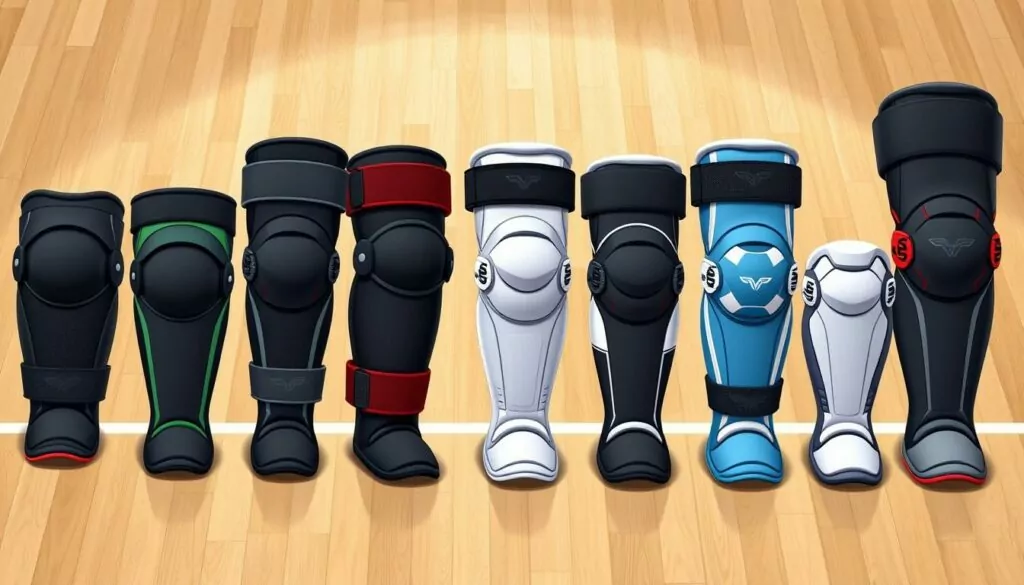
Selecting the right volleyball knee pads is vital for women’s safety and ease on the court. A proper knee pad fit guide helps you get the most from your gear.
Let’s explore the key aspects of volleyball knee pads sizing and women’s knee protection. Your comfort and safety depend on finding the perfect fit.
Volleyball knee pads are made from various materials. Each type offers unique advantages for players on the court.
- Cloth: Lightweight and breathable
- Polyester: Durable and moisture-wicking
- Neoprene: Flexible and water-resistant
- Gel: Shock-absorbing and comfortable
- Memory foam: Conforms to your knees for personalized protection
The right knee pads can greatly improve your game and self-assurance. They’re crucial for several reasons:
| Benefit | Impact |
|---|---|
| Injury prevention | Reduces risk of cuts, bruises, and long-term damage |
| Increased confidence | Allows for more aggressive plays without fear |
| Longevity | Protects knees for extended playing careers |
| Enhanced performance | Enables quicker reactions and movements |
| Value investment | Cost-effective compared to potential medical bills |
To get the most out of your knee pads, proper sizing is key. Measure your knees carefully and check size charts.
By taking time to find the right fit, you’ll protect your knees for years to come. Your future self will appreciate the effort!
How to Measure for the Perfect Fit
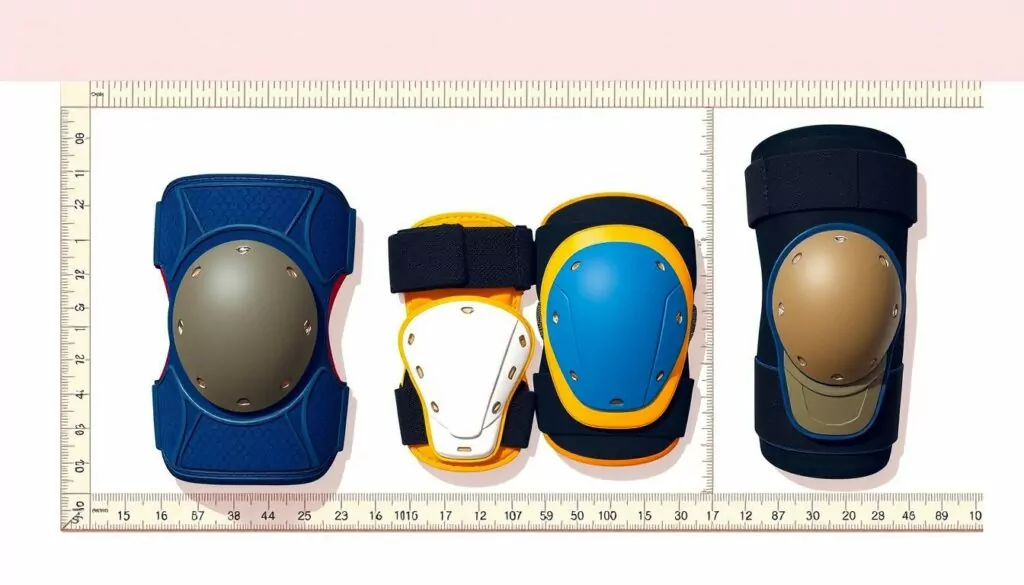
Finding the right volleyball knee pads is vital for comfort and protection. A proper fitting guide ensures you get the best gear. Let’s explore the steps for accurate measurements and common sizing pitfalls.
Step-by-step measuring instructions
To get precise knee pad measurements, follow these steps:
- Stand up and slightly bend your knee.
- Locate a point about 6 inches (15 cm) below your kneecap.
- Wrap a measuring tape around your leg at this point.
- Note the circumference in inches.
Use this measurement to find your ideal size using the following chart:
| Size | Thigh Circumference (inches) |
|---|---|
| Extra Small | 10-12 |
| Small | 12-14 |
| Medium | 14-16 |
| Large | 15-17 |
| Extra Large | 17-20 |
Common sizing mistakes to avoid
Be careful of these errors when using a volleyball gear sizing guide:
- Measuring too high or low on the leg
- Not bending the knee slightly during measurement
- Pulling the tape too tight or leaving it too loose
- Ignoring brand-specific size charts
Knee pads should fit snugly without restricting movement. If you’re between sizes, think about your playing style and comfort preferences.
Size Chart and Fit Guide for Women’s Volleyball Knee Pads
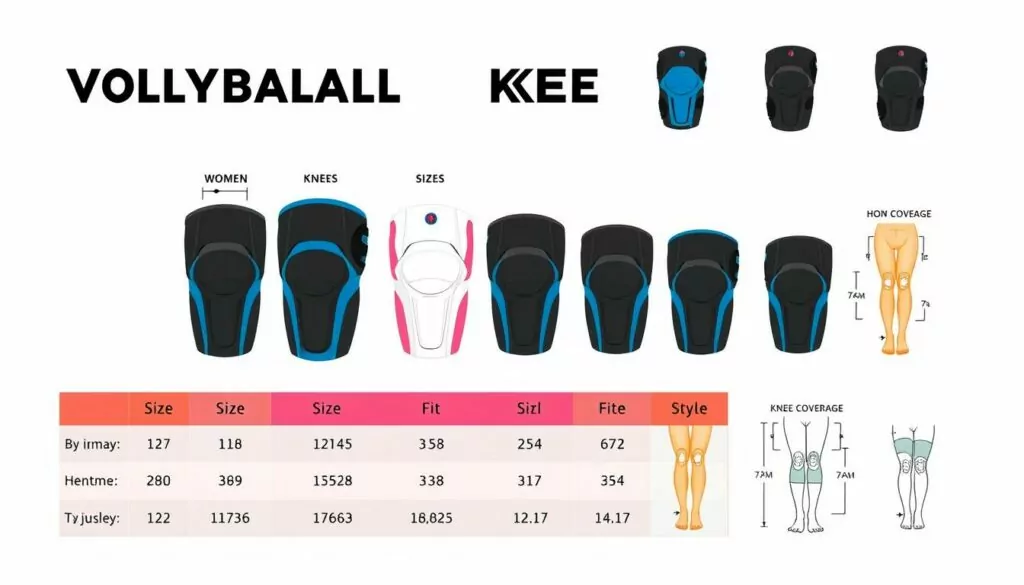
The right fit is vital for volleyball knee pads: women’s sizing and protection. Brands offer sizes from XS to XXL. These cater to various knee circumferences.
- XS/S: 14-15.5 inch knee circumference
- M/L: 15.5-17 inch knee circumference
- XL/XXL: 17-18 inch knee circumference
Between sizes? Choose smaller for a snug fit or larger for looser feel. Knee pads should prevent slipping without limiting movement.
| Brand | Small | Medium | Large |
|---|---|---|---|
| Nike | 13-14.5″ | 14.5-16″ | 16-17.5″ |
| Mizuno | 12-13.5″ | 13.5-15″ | 15-16.5″ |
| ASICS | One-size-fits-all | ||
For the perfect fit, measure your knee circumference with a tailor’s tape. This step ensures you get the right size for optimal protection.
Choosing the Right Level of Protection
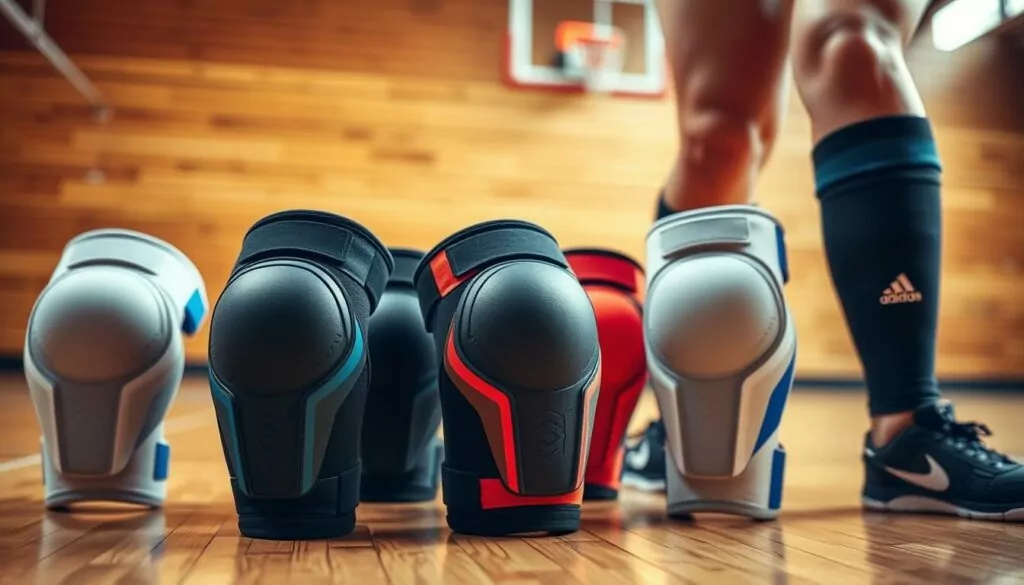
Your safety and performance depend on choosing the right volleyball knee support. The protection level you need varies with your playing style. Let’s look at options for different players.
Light Protection for Casual Players
Casual players benefit from light knee pads for basic protection. These thin pads are comfortable and perfect for occasional games. They guard against minor scrapes without limiting movement.
Medium Protection for Regular Practice
Regular players should opt for medium protection knee pads. These position-specific pads offer better shock absorption and durability. They’re built to withstand frequent use while keeping you comfortable.
Heavy-Duty Protection for Competitive Play
Competitive players require heavy-duty volleyball safety gear. These knee pads provide maximum protection against impacts and stress. They feature thick padding and advanced materials for intense play.
Your ideal protection level depends on your playing surface and frequency. Choose knee pads that boost your confidence without hindering performance. The right gear allows you to play your best game.
| Protection Level | Player Type | Key Features |
|---|---|---|
| Light | Casual | Thin, basic protection |
| Medium | Regular | Better shock absorption, durable |
| Heavy-Duty | Competitive | Maximum protection, advanced materials |
Position-Specific Knee Pad Recommendations
The right knee pads can boost your volleyball game. Each position needs unique protective gear. Let’s look at some top picks for different roles.
Liberos and defensive specialists often dive and slide. They need knee pads with extra cushioning. Gel knee pads are ideal for these players.
The Asics volleyball knee pads with GEL Cushioning System offer great protection. They absorb shock well during falls and dives.
Setters need more flexibility in their moves. Low-profile knee pads work best for them. They give good protection without limiting movement.
The Nike Essentials Volleyball Knee Pads are a popular choice. They protect well without being bulky.
Hitters and blockers need robust protection. The Mizuno LR6 Knee Pads are a solid option. They guard against impacts from jumps without limiting mobility.
- Liberos: Thick, gel-based knee pads
- Setters: Low-profile, flexible knee pads
- Hitters/Blockers: Durable knee pads with good impact protection
The best knee pads fit well and feel comfy. Try different types to find your perfect match. Clean your knee pads often and check for wear.
Good gear care helps your knee pads last longer. It also keeps you safe on the court.
Top Brands for Women’s Volleyball Knee Pads
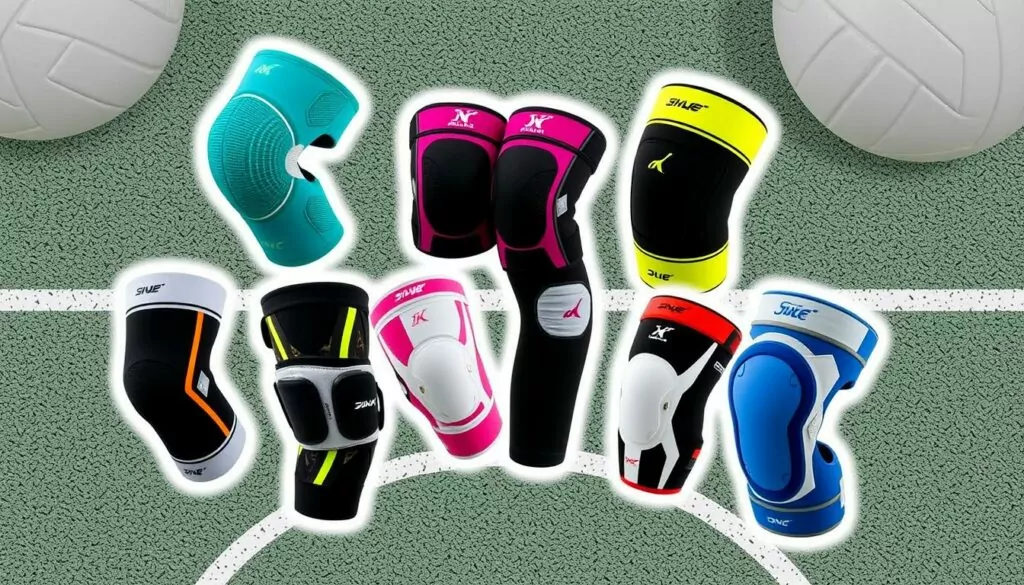
Protecting your knees is vital in volleyball. Let’s look at some leading brands for women’s volleyball knee pads. These brands offer top-notch protection and comfort for players.
Nike Volleyball Knee Pads
Nike’s Essentials Volleyball Knee Pads are a popular choice. They offer a low profile fit and great comfort. These pads protect your knees without limiting your movement on the court.
Mizuno Knee Pads
Mizuno is famous for its high-quality padding. Their LR6 model feels minimal but offers solid protection. The T10 Plus Kneepad has a moisture-wicking sleeve and dense foam padding.
ASICS Volleyball Gear
ASICS brings innovation to volleyball gear. Their Ace Low Profile Volleyball Knee Pad uses GEL technology. This tech provides excellent shock absorption and flexibility for all skill levels.
| Brand | Model | Key Feature |
|---|---|---|
| Nike | Essentials | Low profile fit |
| Mizuno | LR6 | Minimalistic feel |
| ASICS | Ace Low Profile | GEL technology |
The right knee pads can boost your confidence on the court. Good protection allows for quick, fearless actions. This can lead to better performance and future opportunities in volleyball.
Caring for Your Volleyball Knee Pads
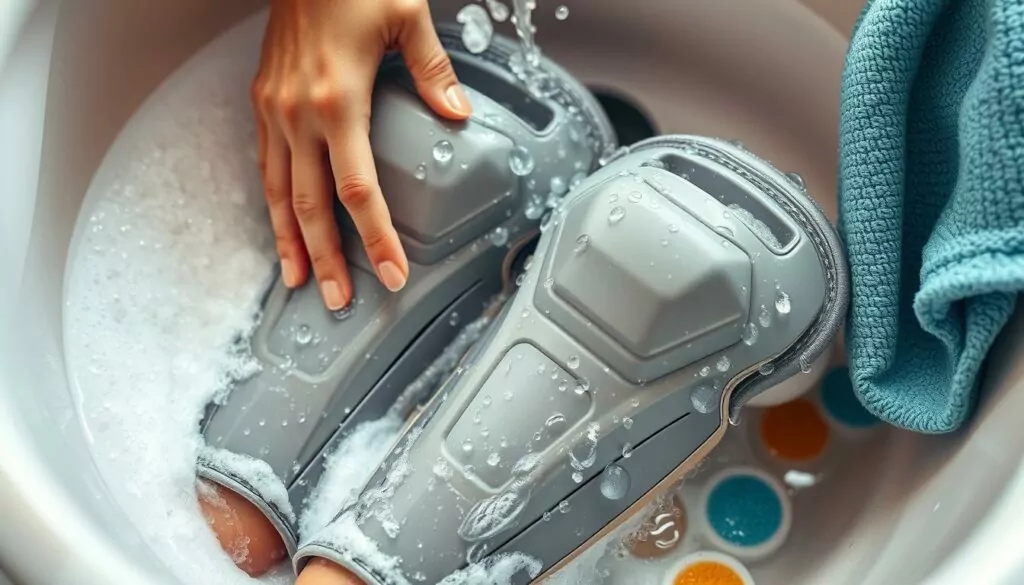
Volleyball knee pads protect you during intense gameplay. Proper care keeps your gear effective. Let’s explore how to maintain your knee pads.
Cleaning and Maintenance Tips
Regular maintenance extends knee pad lifespan. Air out your knee pads after each use. This prevents moisture buildup and preserves impact protection.
Follow manufacturer instructions when washing. Air dry to protect the padding. Avoid machine drying or direct sunlight.
- Wash knee pads following manufacturer instructions
- Air dry to prevent damage to padding
- Avoid machine drying or direct sunlight exposure
Hand wash in cool water with mild detergent for thorough cleaning. Gently squeeze out excess water. Lay flat to dry.
Proper care ensures continued protection and hygiene. This keeps your knee pads fresh and effective.
When to Replace Your Knee Pads
Recognizing replacement signs is crucial for adequate protection. Watch for these indicators:
- Compressed or flattened padding
- Decreased elasticity in the fabric
- Visible wear or tears
- Reduced comfort during use
Consider new knee pads if you notice these signs. Proper sizing is vital for optimal protection.
Measure your lower thigh circumference for the right fit. It should range from 34cm to 57cm.
Follow these care tips to maximize knee pad lifespan. Stay alert to wear signs. This ensures you maintain protection on the court.
The Impact of Proper Knee Protection on Performance
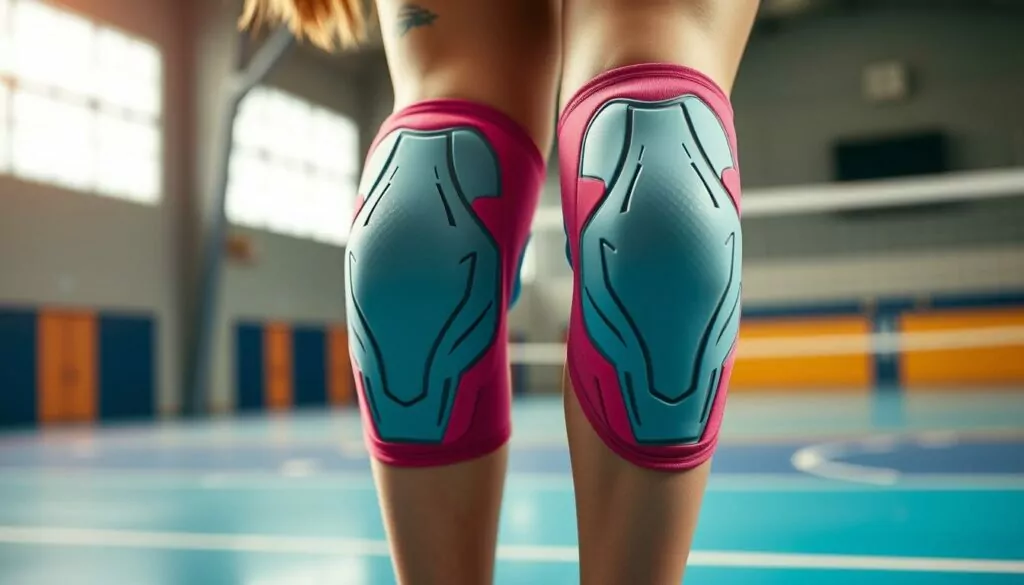
Knee protection is vital for better volleyball performance. Wearing the right gear prevents injuries, with knee pads being crucial. Most volleyball players wear knee pads below their knees for protection and flexibility.
Comfortable volleyball padding helps players stay focused during intense games. Feeling secure allows for more aggressive play. This confidence boost improves overall game performance, including diving and sliding.
Properly worn knee pads enhance agility and mobility. They promote unrestricted movement during play. This optimal positioning improves range of motion and protection during sliding and diving.
| Aspect | Impact on Performance |
|---|---|
| Injury Prevention | Reduces risk of acute injuries and chronic conditions |
| Confidence | Enhances focus on gameplay |
| Agility | Improves mobility and range of motion |
| Comfort | Allows for longer, more intense practice sessions |
Proper knee protection allows players to push their limits safely. This leads to more effective training sessions. It also improves endurance during long matches and overall court performance.
Common Myths About Volleyball Knee Pads Debunked
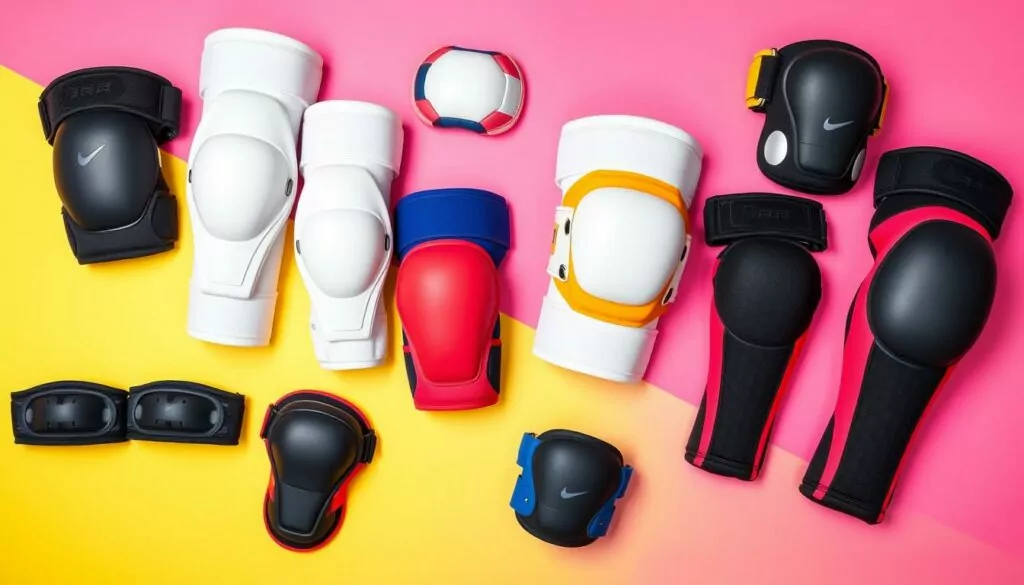
Volleyball knee pads are crucial for women’s gear, but myths abound. Let’s debunk some common misconceptions about these essential protectors.
Myth 1: Knee pads limit movement. This is false. Properly sized volleyball knee pads allow full mobility. Finding the right compression fit ensures protection without hampering performance.
Myth 2: One size fits all knee pads. This myth can lead to inadequate protection. Players come in different sizes, so should their knee pads.
Proper sizing guarantees optimal coverage and comfort during intense games. It’s vital for effective protection on the court.
Myth 3: Only beginners need knee pads. In reality, pro athletes rely on knee protection too. From casual players to competitive stars, everyone benefits from well-fitted knee pads.
| Myth | Reality |
|---|---|
| Knee pads restrict movement | Proper sizing ensures full mobility |
| One size fits all | Different sizes for optimal protection |
| Only for beginners | Used by players at all levels |
Knowing these facts helps players choose the right volleyball gear. The correct knee pad compression fit can improve your game.
It also keeps you safe on the court. Choose wisely and play confidently.
Conclusion
Finding the right volleyball knee pads is crucial for better gameplay and knee protection. This guide helps you choose the perfect fit for your needs. The volleyball court demands intense play, with quick moves and frequent ball contacts.
Your knee pads should match your position and playing style. Setters need protection for quick moves near the attack line. Hitters require support for leaps at the net. Good knee pads can prevent common injuries like meniscus tears and sprains.
Well-fitted knee pads are an investment in your volleyball future. They benefit both casual players and competitive athletes. Take time to measure and choose the right padding level. Proper care of your knee pads ensures safer, more comfortable play on the court.
FAQ
Why is knee protection important in volleyball?
Knee protection is vital in volleyball. Knees take a lot of impact during jumps, dives, and slides. Good knee pads prevent injuries and boost confidence.
They improve performance and help players stay in the game longer. Proper protection can make a big difference in a player’s career.
What are the different types of volleyball knee pads for women?
Women’s volleyball knee pads come in various types. They range from basic models like Atena to pro-grade options like Tokyo and Seth.
These pads differ in materials, padding thickness, and design features. Players can choose based on their specific needs and preferences.
What key features should I look for in women’s volleyball knee pads?
Look for material quality, padding thickness, and breathability in volleyball knee pads. Check for moisture-wicking properties and overall durability too.
Top-notch knee pads often use tubular elastic cotton and moulded polyurethane foam. These materials provide excellent protection and comfort for players.
How do I measure for the perfect fit in volleyball knee pads?
To measure for knee pads, use a tape 15 cm below your kneecap. Bend your knee slightly for accuracy.
Common mistakes include measuring too high or low on the leg. Also, consider your personal preference for fit tightness.
What protection level should I choose for volleyball knee pads?
Protection level depends on how intensely you play. Light protection works for casual players, medium for regular practice.
Heavy-duty pads suit competitive play. Consider your playing surface, frequency, and comfort when choosing protection level.
Are there position-specific recommendations for volleyball knee pads?
Different volleyball positions may need specific knee pad features. Liberos and defensive specialists might prefer thicker padding.
Setters might choose more flexible options. Think about your position’s demands when picking knee pads.
What are some top brands for women’s volleyball knee pads?
Top brands include Nike, Mizuno, and ASICS. Nike offers various sizes and styles. Mizuno is known for high-quality padding.
ASICS provides options for different skill levels. Erreà is another reputable brand, offering models like Tokyo, Seth, and Atena.
How do I care for and maintain my volleyball knee pads?
Proper care extends knee pad life. Wash regularly following manufacturer instructions. Air dry to prevent damage.
Replace knee pads when padding compresses or elasticity decreases. Look for visible wear too. Regular maintenance ensures continued protection and hygiene.
